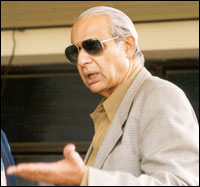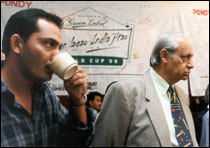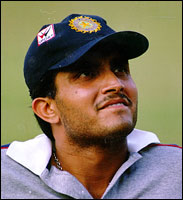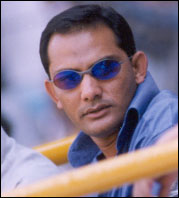 Home > Cricket > Diary archives
Home > Cricket > Diary archivesAugust 21, 2001
Who, or what, is a Raj Singh Dungarpur?
Prem Panicker
 He is, to paraphrase one of Indian cricket's long-standing legends, a man
with a passion for cricket. A man who lives, eats, and breathes, cricket. A
man who believes in telling it like it is. And finally, a man with a heart
as big as all outdoors -- and that, a heart full of cricket and its best
interests.
He is, to paraphrase one of Indian cricket's long-standing legends, a man
with a passion for cricket. A man who lives, eats, and breathes, cricket. A
man who believes in telling it like it is. And finally, a man with a heart
as big as all outdoors -- and that, a heart full of cricket and its best
interests.
Right.
Those characteristics were first manifest way back in 1989-1990. India, under Krishnamachari Srikkanth, had just returned from a four-Test series in Pakistan, with honours even. How many captains, and how many Indian teams, could boast of that? The answer, in a word, is -- none.
And so Dungarpur, then chairman of the national selectors, rewarded this effort by getting rid of Dilip Vengsarkar, Krishnamachari Srikkanth and Ravi Shastri. Walked up to Mohammad Azharuddin. And asked him, famously: 'Mian, kaptaan banoge?'
The three axed cricketers, you see, were showing signs of unrest. Signs of taking up the cause of the players. Signs of fighting for better conditions, better pay, better treatment.
Indian cricket -- as those who have their best interests at heart will tell you -- cannot afford such unrest. We cannot afford cricketers who will stand up for themselves and their mates. And so, mian kaptaan ban gaya.
 In 1996, India lost to England in England. Azhar had scores of 13, 0, 16, 5,
8. And Dungarpur was among the very first to suggest that the pressures of
captaincy were telling on his 'mian', and that he should go. There is no
alternative to Sachin Tendulkar, it was suggested.
In 1996, India lost to England in England. Azhar had scores of 13, 0, 16, 5,
8. And Dungarpur was among the very first to suggest that the pressures of
captaincy were telling on his 'mian', and that he should go. There is no
alternative to Sachin Tendulkar, it was suggested.
Against the West Indies in 1997, Tendulkar had scores of 7, 15, 88, 92, 4 and 83. The pressures of captaincy, Dungarpur and others suggested, was getting to India's premier batsman. It was in the best interests of Indian cricket, they said, for Tendulkar to be given a break from captaincy, for Azharuddin to be brought back.
Azhar's scores on that tour? 5, 1, 17, 9, 31. On that tour, what is more, talk about his attitude grew to such a crescendo that the selectors actually called him in for a disciplinary hearing. And then, of course, made him captain. Dungarpur, on that occasion, made a famous statement: "Azhar is ideally fitted to lead the side now, his domestic life is now happy again."
And so it went. Azhar out, Sachin back. In February of 2000, India played a two Test series against South Africa. Sachin's scores: 97, 8, 21, 20.
"The pressures of captaincy...." -- that old, familiar song was sung with renewed vigour. And Sourav Ganguly was made captain. Ganguly's scores during that same two-Test series?: 2, 31, 1, 13. Was that run of poor scores the result of pressure of NOT being captain? Dungarpur -- and those others with the best interests of Indian cricket at heart did not tell us.
 What Dungarpur did tell us, very vehemently, was: "Ganguly is the man best
suited for the job. There is no alternative to Ganguly."
What Dungarpur did tell us, very vehemently, was: "Ganguly is the man best
suited for the job. There is no alternative to Ganguly."
Today, that statement has been altered marginally, the words rearranged. It now reads, "Ganguly is not an alternative. Dravid is the man best fitted for the job."
In an interview to a leading newspaper, Raj Singh then went further, to say, "Personally, I never thought of him as captaincy material. He got it by default when Sachin gave up the job."
Again, Dungarpur believes that one major problem with Ganguly is that he is uncommunicative. "Even Azhar was never so aloof," says the man.
At his age, Dungarpur could be forgiven, I guess, for forgetting today what he said yesterday. Which is why the rest of us have to remind him. Here is a vintage quote, on Azhar, by the man himself: "''Azhar has been the captain for the last nine years and his record as a captain is good. When he was winning no one said a word, but now everybody is finding him uncommunicative. Steve Waugh is like that, even Stephen Fleming does not communicate. It is not fair.''
Right. Begs the question: It is okay for Azhar to be uncommunicative, ditto Steve Waugh, ditto Stephen Fleming, but not ditto Dungarpur's pet peeve of the day?
All this takes me back to the question I asked at the outset: Who, or what, is a Raj Singh Dungarpur?
Meanwhile, here are a few statistics, of two batsmen.
The scoring sequence of the first, in ten successive Test innings, reads: 30, 8, 1, 23, 48, 22, 4, 5, 9, 0.
The scoring sequence of the second, again in eleven successive Test innings, reads: 0, 26, 8, 0, 16, 16, 14, 9, 0, 45, 23.
Which of those, would you say, is the better batsman? Again, if you had to pick a captain from either of those two, who would you pick?
For the record, the first is Sourav Ganguly's run of scores before the just-completed Galle Test. The second is Sanath Jayasuriya's run of scores, again before Galle.
In Galle, famously, two Indian bowlers managed to bat the Lankan captain back into form. The Indian captain, however, received no such favours from the opposing bowlers -- nor the standing umpires, come to think of it.
One of them -- Jayasuriya -- averages 40.01. As captain, his record reads 22 played, seven won, 8 lost. The other, Ganguly, averages 41.30. And his captaincy record reads 9 played, 5 won, 3 lost.
Strange -- there has been no outcry in Sri Lanka over Sanath Jayasuriya's loss of form. Then again, maybe not so strange -- Lanka, unlike India, is not blessed with "passionate students of the game".
Not being as passionate, nor even having studied the game for as long, and as closely, I find myself unable to answer a couple of questions.
 One: Over the last ten years, the "pressures of captaincy" has, famously,
affected Mohammad Azharuddin (twice), Sachin Tendulkar (twice) and now
Sourav Ganguly. Would those who have studied the game be able to assure us
that the same thing will not happen to Rahul Dravid?
One: Over the last ten years, the "pressures of captaincy" has, famously,
affected Mohammad Azharuddin (twice), Sachin Tendulkar (twice) and now
Sourav Ganguly. Would those who have studied the game be able to assure us
that the same thing will not happen to Rahul Dravid?
Two: Over the last decade, we have changed captains 5 times. And the team has remained as inconsistent, it has under-performed as regularly. Will yet another change in captaincy change that, make the team more consistent?
Or are these frequent changes of captaincy merely an indication of the inability of those who are passionate about Indian cricket, those who study its fortunes so intensely, to come up with any lasting solutions to the real problems afflicting the game in this country?
Postscript: In February of 2000, we published this column on the question of captaincy. The last part of the column looked at Sourav Ganguly.
Leads to the question: Is Ganguly's combative nature, as opposed to his lack of runs, the real reason why he is in trouble today?
Here's a clue: When Raj Singh was asked whether Dravid's form wouldn't suffer as a result of being made captain, this is what he said: "Yes, Dravid could lose his form too. But at least in temperament, he will provide no reason for complaint."
Huh? What precisely does that mean? That Dravid might begin scoring binary, like Ganguly is doing now, but that is okay? When he says temperamentally there will be no cause for complaint, does he mean that Dravid will not be guilty of standing up to outfits such as the Aussies and giving back as good as he got?
Or does he mean that Dravid will not take on the selectors, and the cricket board, as Ganguly is showing a penchant for doing?
Or could it be that Indian cricket is so rich in batting riches, that Dungarpur and his ilk have hit on the ploy of making someone captain, letting his batting go to pieces, sacking him, and making the next in line captain, ad infinitum?
Maybe the passionate student of cricket, who drops the cliche 'Form is temporary, class is permanent' at the drop of a bat, could give us an answer to that one.
The Rediff Email Diary -- the complete archives
![]()
![]()
Email : Prem Panicker
©1996 to 2001 rediff.com India Limited. All Rights Reserved.